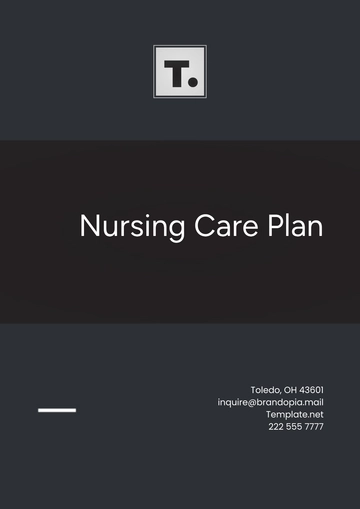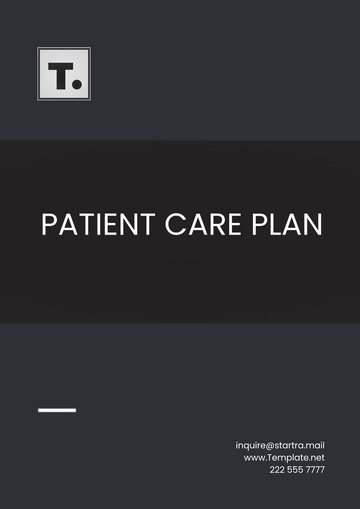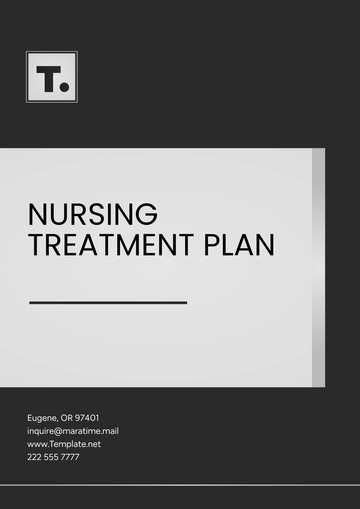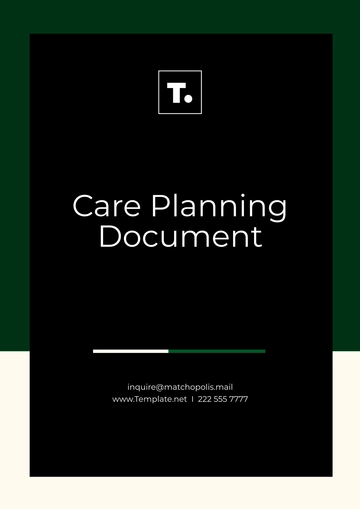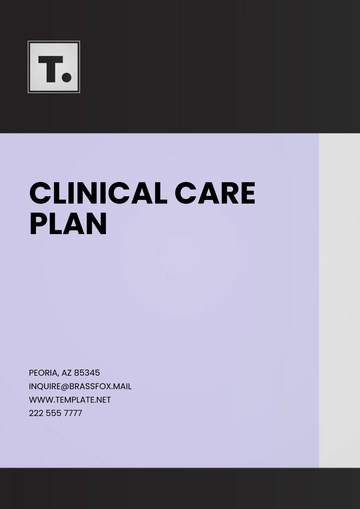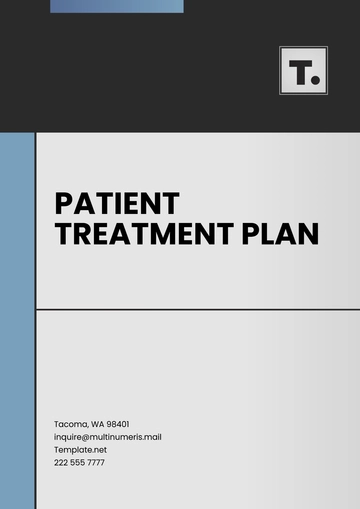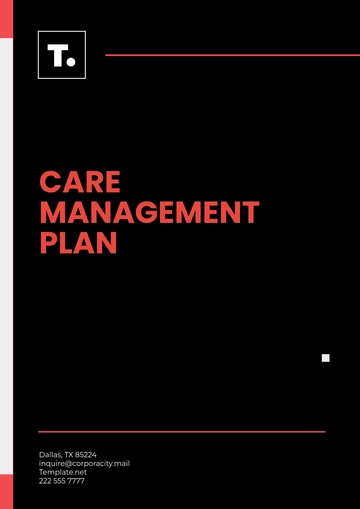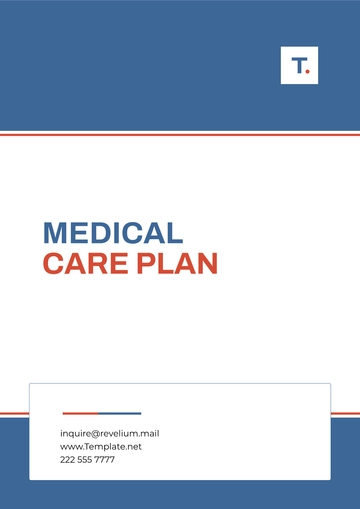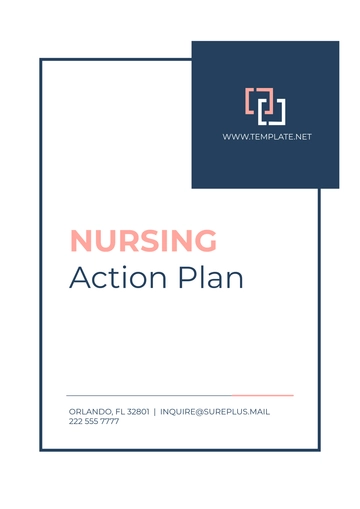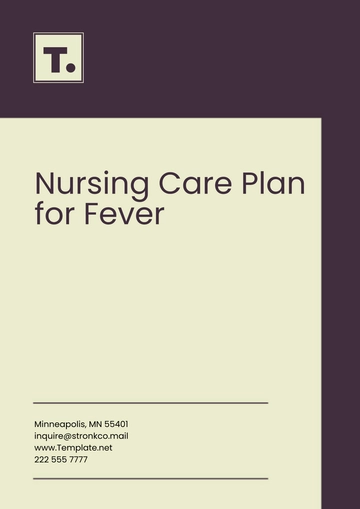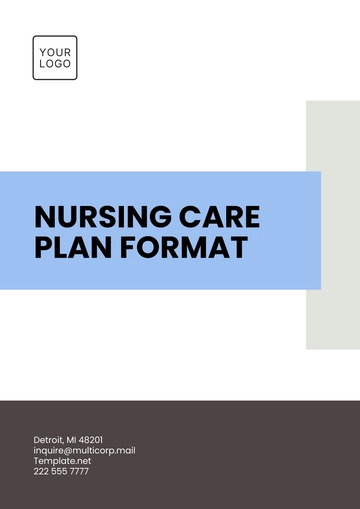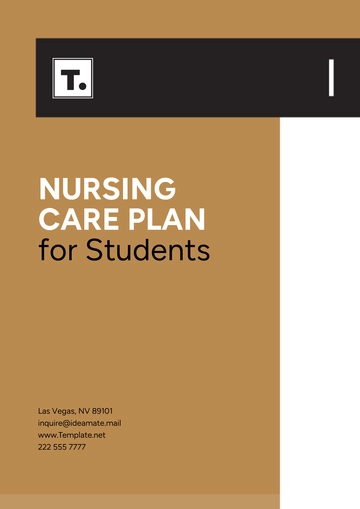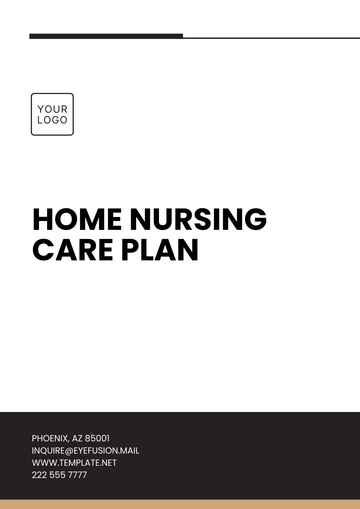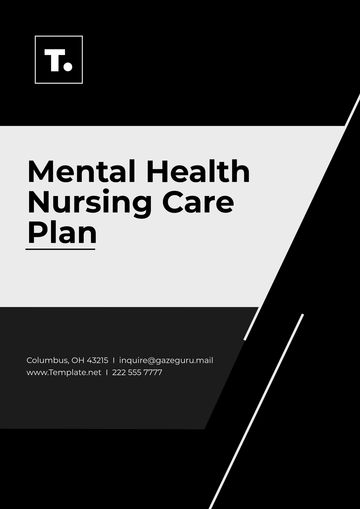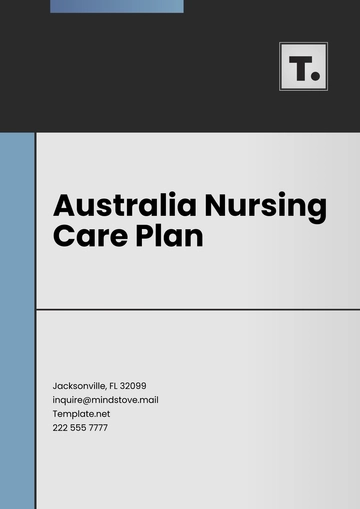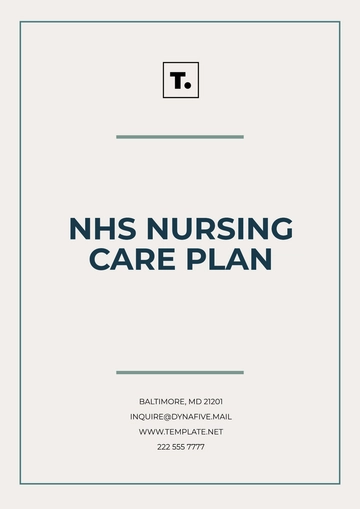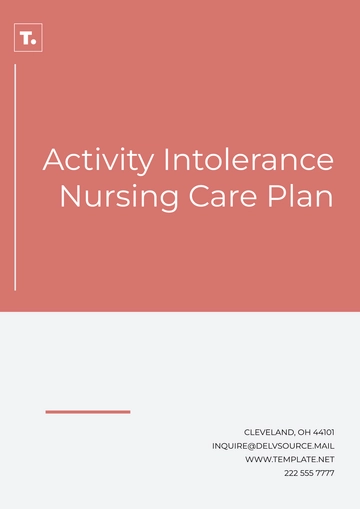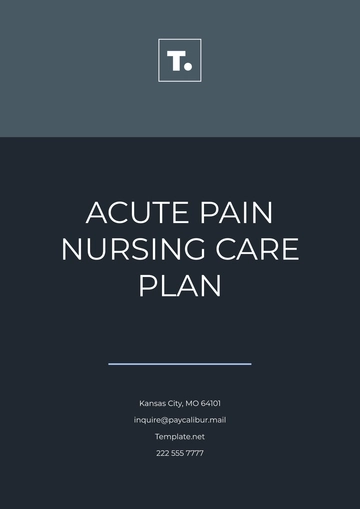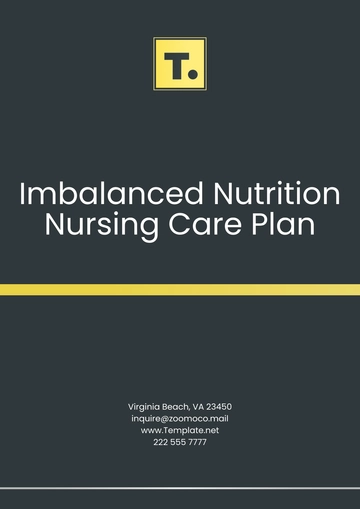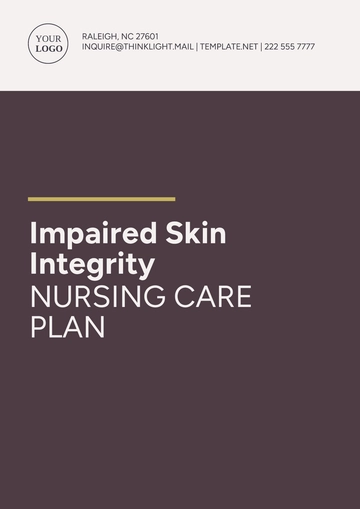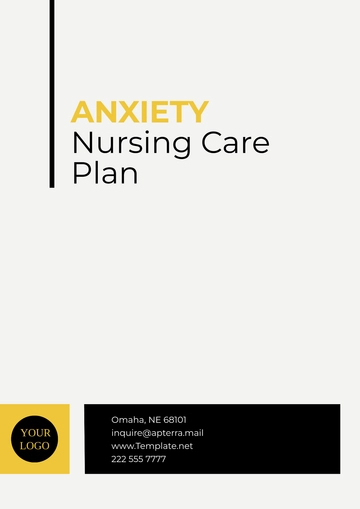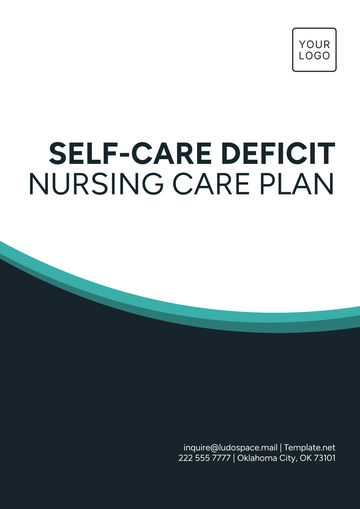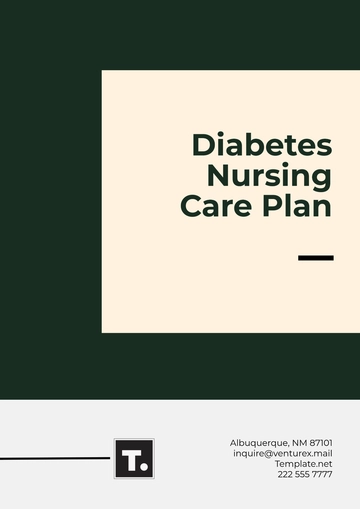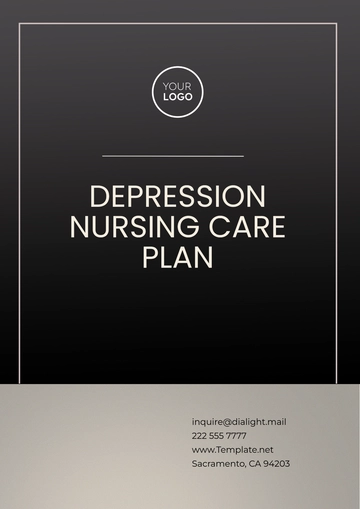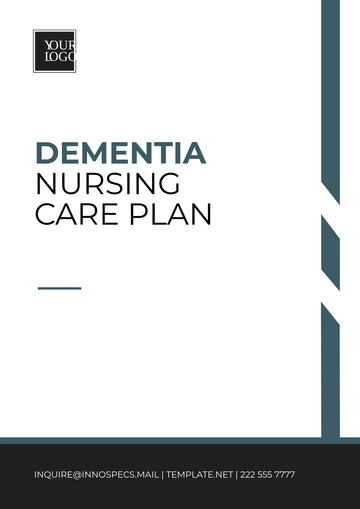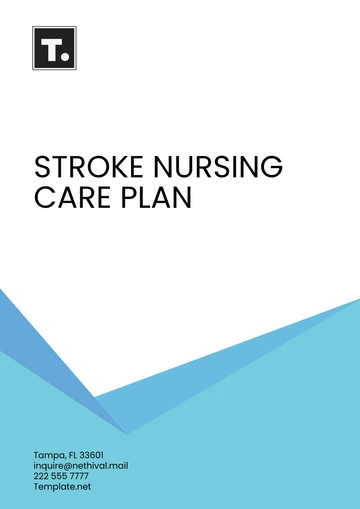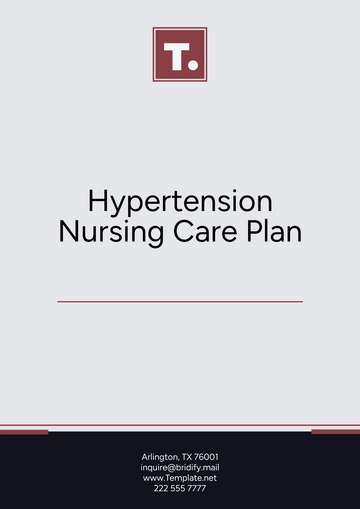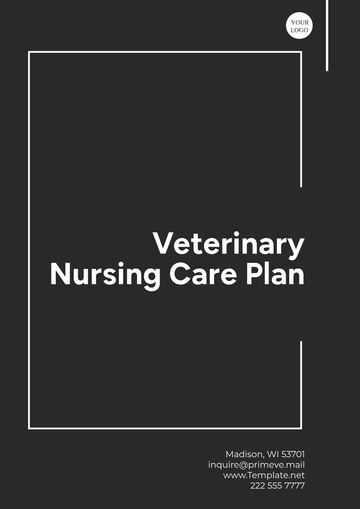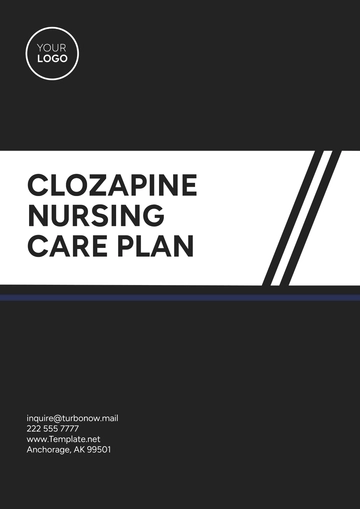Free Nursing Home Health Aide Care Plan
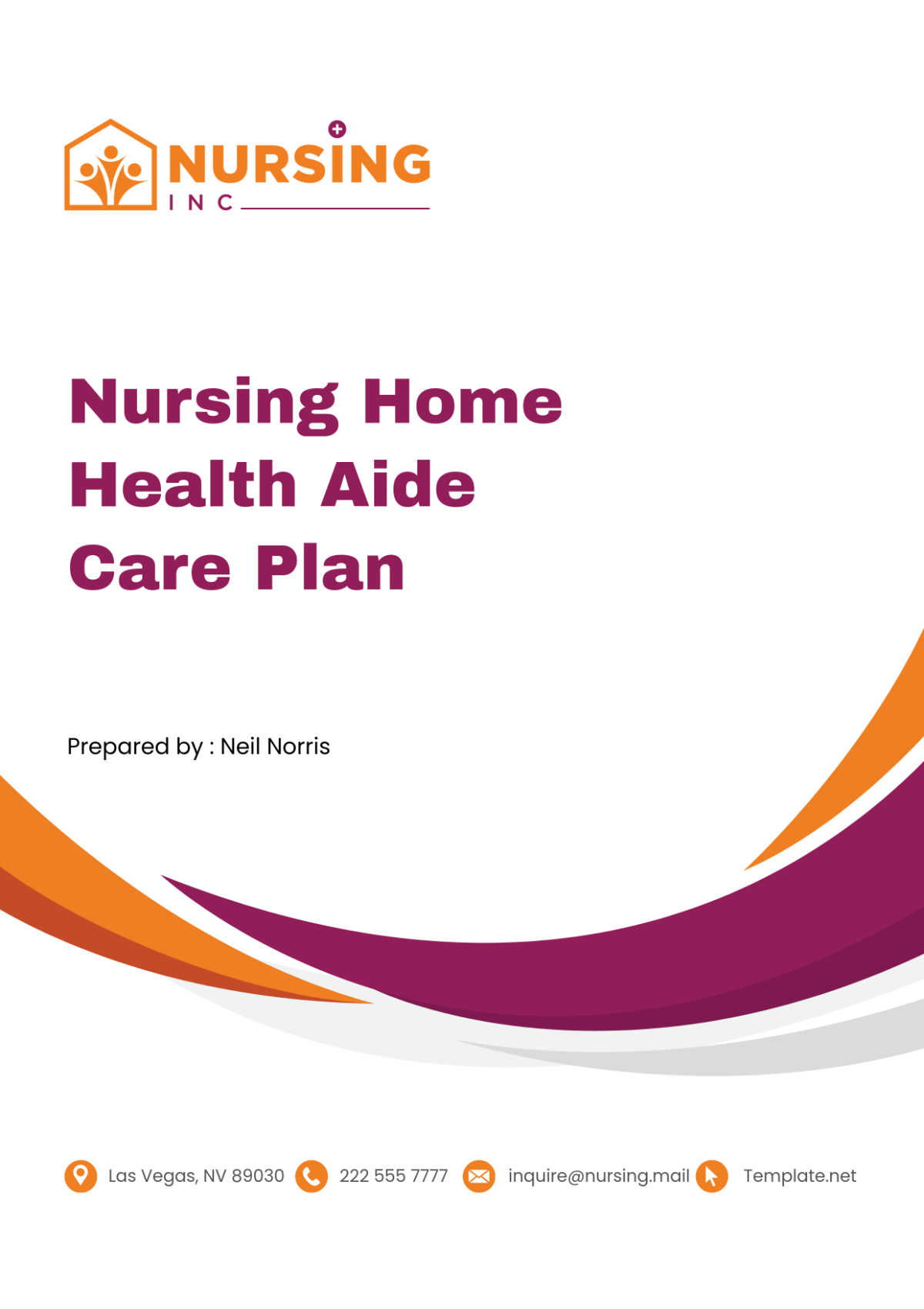
I. Introduction
The purpose of this Nursing Home Health Aide Care Plan is to deliver a structured and organized approach to providing high-quality care to residents in nursing home settings. By implementing this plan, [Your Company Name] aims to address every aspect of the resident's health and well-being with precision and compassion. This care plan is designed to ensure that each resident receives personalized attention based on their individual needs and preferences, promoting their physical, emotional, and psychological well-being.
The plan aligns with current US regulations and best practices, incorporating guidelines from the Centers for Medicare & Medicaid Services (CMS) and the National Institute on Aging (NIA). It includes comprehensive assessments, individualized care goals, and specific interventions tailored to each resident's unique condition. By adhering to this care plan, [Your Company Name] ensures that all care provided meets high standards of quality and compliance, fostering a supportive and effective environment for residents and staff alike.
II. Assessment
A thorough and ongoing assessment is crucial to delivering personalized and effective care in a nursing home setting. At [Your Company Name], we prioritize a comprehensive evaluation of each resident’s physical, emotional, and social needs to ensure that our care plan is accurately tailored to their requirements. This assessment encompasses several key components:
Medical History Review: The initial assessment begins with a detailed review of the resident’s medical history, including past illnesses, surgeries, chronic conditions, allergies, and family health history. This review helps identify any pre-existing conditions that may impact the resident’s care and ensures that all relevant information is considered when planning their treatment. It is essential to update this information regularly to account for any changes in the resident’s health status.
Physical Examination: A thorough physical examination is conducted to assess the resident’s current health status. This includes measuring vital signs (e.g., blood pressure, pulse, temperature), evaluating overall physical health, and identifying any acute or chronic physical issues. Regular follow-up examinations help monitor the resident’s condition over time, allowing for timely adjustments to their care plan as needed.
Medication Review: A comprehensive review of the resident’s current medications, including prescription drugs, over-the-counter medications, and supplements, is essential for managing their health effectively. This review aims to ensure that medications are being taken correctly, to identify potential drug interactions or side effects, and to verify that the medication regimen aligns with the resident’s current health needs. Regular medication reviews help prevent complications and optimize therapeutic outcomes.
Psychosocial Assessment: Understanding the resident’s emotional and psychological well-being is as important as addressing their physical health. A psychosocial assessment includes evaluating the resident’s mental health status, social interactions, and emotional needs. This assessment considers factors such as mood, cognitive function, and social support systems, helping to identify any psychological issues that may require intervention or additional support.
Functional Assessment (ADLs and IADLs): The functional assessment evaluates the resident’s ability to perform Activities of Daily Living (ADLs) and Instrumental Activities of Daily Living (IADLs). ADLs include basic self-care tasks such as bathing, dressing, eating, and mobility. IADLs involve more complex tasks necessary for independent living, such as managing finances, handling transportation, and maintaining a household. Assessing these functions helps determine the level of assistance required and guides the development of personalized care strategies.
III. Care Plan Objectives
The objectives of this care plan are designed to provide a holistic approach to resident care, aiming to enhance overall well-being. At [Your Company Name], our goals are to maintain or improve each resident's physical health, offer robust support for emotional well-being, and elevate the overall quality of life. These objectives ensure that care is not only effective but also compassionate and tailored to individual needs.
The objectives of this care plan are:
To maintain or improve the resident's physical health
To support the resident's emotional well-being
To enhance the resident's quality of life
IV. Interventions
To ensure the highest standard of care for each resident, it is essential to implement targeted interventions based on the comprehensive assessment results. At [Your Company Name], we have developed specific strategies to address key areas of care, including personal care, medication management, nutrition, mobility, and emotional support. Each intervention is designed to meet the individual needs of the resident, promoting their health, comfort, and overall quality of life. By focusing on these targeted actions, we aim to deliver effective and compassionate care tailored to each resident’s unique circumstances and preferences.
Based on the assessment, the following interventions should be implemented:
Area of Care | Interventions |
|---|---|
Personal Care |
|
Medication Management |
|
Nutrition |
|
Mobility |
|
Emotional Support |
|
V. Evaluation
Regular evaluations are a critical component of ensuring the ongoing effectiveness and relevance of the care plan. At [Your Company Name], these evaluations are systematically conducted to monitor and enhance the quality of care provided to each resident.
Reviewing the Resident's Health Status: The first step in the evaluation process involves a comprehensive review of the resident’s current health status. This includes assessing physical health through routine check-ups and diagnostic tests, as well as evaluating emotional and psychological well-being. Health status reviews help identify any improvements, declines, or new issues that may require attention. By staying informed about the resident's overall condition, we can ensure that the care plan remains aligned with their evolving needs.
Adjusting Interventions as Necessary: Based on the health status review, interventions may need to be adjusted to better meet the resident's needs. This could involve modifying personal care routines, changing medication dosages, or introducing new support strategies. Adjustments are made in response to observed changes in the resident’s condition, feedback from the resident and their family, or emerging best practices. Ensuring that interventions are responsive and adaptable is crucial for providing effective care and achieving desired outcomes.
Documenting Any Changes in the Resident's Condition: Accurate and thorough documentation is essential for tracking the resident’s progress and changes over time. This includes recording any variations in health status, alterations in care needs, and responses to interventions. Proper documentation not only supports continuity of care but also facilitates communication among care team members and helps in making informed decisions regarding the resident's care plan.
By implementing these evaluation practices, [Your Company Name] ensures that the care provided is continuously optimized to support each resident’s health and well-being, fostering a responsive and high-quality care environment.
The Nursing Home Health Aide Care Plan at [Your Company Name] is designed to deliver exceptional, personalized care through thorough assessment, targeted interventions, and regular evaluations. By focusing on the resident's physical, emotional, and social needs, we aim to enhance their overall quality of life and ensure that our care remains effective and responsive. Commitment to these principles ensures the highest standard of care for every resident.
- 100% Customizable, free editor
- Access 1 Million+ Templates, photo’s & graphics
- Download or share as a template
- Click and replace photos, graphics, text, backgrounds
- Resize, crop, AI write & more
- Access advanced editor
Enhance patient care with the Nursing Home Health Aide Care Plan Template from Template.net. This editable and customizable template simplifies creating detailed care plans. Fully editable in our Ai Editor Tool, it ensures a professional and tailored approach to meet individual patient needs, improving care quality and efficiency.
You may also like
- Finance Plan
- Construction Plan
- Sales Plan
- Development Plan
- Career Plan
- Budget Plan
- HR Plan
- Education Plan
- Transition Plan
- Work Plan
- Training Plan
- Communication Plan
- Operation Plan
- Health And Safety Plan
- Strategy Plan
- Professional Development Plan
- Advertising Plan
- Risk Management Plan
- Restaurant Plan
- School Plan
- Nursing Home Patient Care Plan
- Nursing Care Plan
- Plan Event
- Startup Plan
- Social Media Plan
- Staffing Plan
- Annual Plan
- Content Plan
- Payment Plan
- Implementation Plan
- Hotel Plan
- Workout Plan
- Accounting Plan
- Campaign Plan
- Essay Plan
- 30 60 90 Day Plan
- Research Plan
- Recruitment Plan
- 90 Day Plan
- Quarterly Plan
- Emergency Plan
- 5 Year Plan
- Gym Plan
- Personal Plan
- IT and Software Plan
- Treatment Plan
- Real Estate Plan
- Law Firm Plan
- Healthcare Plan
- Improvement Plan
- Media Plan
- 5 Year Business Plan
- Learning Plan
- Marketing Campaign Plan
- Travel Agency Plan
- Cleaning Services Plan
- Interior Design Plan
- Performance Plan
- PR Plan
- Birth Plan
- Life Plan
- SEO Plan
- Disaster Recovery Plan
- Continuity Plan
- Launch Plan
- Legal Plan
- Behavior Plan
- Performance Improvement Plan
- Salon Plan
- Security Plan
- Security Management Plan
- Employee Development Plan
- Quality Plan
- Service Improvement Plan
- Growth Plan
- Incident Response Plan
- Basketball Plan
- Emergency Action Plan
- Product Launch Plan
- Spa Plan
- Employee Training Plan
- Data Analysis Plan
- Employee Action Plan
- Territory Plan
- Audit Plan
- Classroom Plan
- Activity Plan
- Parenting Plan
- Care Plan
- Project Execution Plan
- Exercise Plan
- Internship Plan
- Software Development Plan
- Continuous Improvement Plan
- Leave Plan
- 90 Day Sales Plan
- Advertising Agency Plan
- Employee Transition Plan
- Smart Action Plan
- Workplace Safety Plan
- Behavior Change Plan
- Contingency Plan
- Continuity of Operations Plan
- Health Plan
- Quality Control Plan
- Self Plan
- Sports Development Plan
- Change Management Plan
- Ecommerce Plan
- Personal Financial Plan
- Process Improvement Plan
- 30-60-90 Day Sales Plan
- Crisis Management Plan
- Engagement Plan
- Execution Plan
- Pandemic Plan
- Quality Assurance Plan
- Service Continuity Plan
- Agile Project Plan
- Fundraising Plan
- Job Transition Plan
- Asset Maintenance Plan
- Maintenance Plan
- Software Test Plan
- Staff Training and Development Plan
- 3 Year Plan
- Brand Activation Plan
- Release Plan
- Resource Plan
- Risk Mitigation Plan
- Teacher Plan
- 30 60 90 Day Plan for New Manager
- Food Safety Plan
- Food Truck Plan
- Hiring Plan
- Quality Management Plan
- Wellness Plan
- Behavior Intervention Plan
- Bonus Plan
- Investment Plan
- Maternity Leave Plan
- Pandemic Response Plan
- Succession Planning
- Coaching Plan
- Configuration Management Plan
- Remote Work Plan
- Self Care Plan
- Teaching Plan
- 100-Day Plan
- HACCP Plan
- Student Plan
- Sustainability Plan
- 30 60 90 Day Plan for Interview
- Access Plan
- Site Specific Safety Plan
